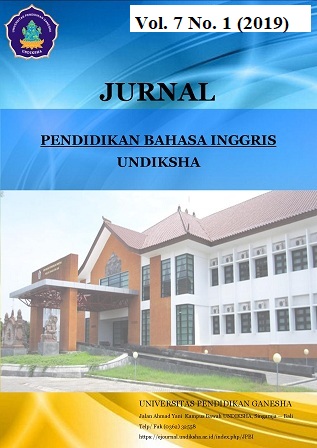IMPROVING STUDENTS’ ACHIEVEMENT IN WRITING DESCRIPTIVE PARAGRAPHS BY USING PICTURE DICTATION TECHNIQUE
DOI:
https://doi.org/10.23887/jpbi.v7i1.20603Abstract
This study was classroom based action research which aimed to find out whether the use of Picture Dictation technique can improve students’ ability in writing descriptive paragraph, especially in developing the ideas, organizing the ideas, grammar, using appropriate mechanics, vocabulary and content. There were two kinds of data which were collected through tests, questionnaires, and writer’s diary. The result of the tests showed that the students’ writing achievement was improved in each cycle. The students’ mean score was 54 in pre test, 65.4 in post test 1, and improved became 80.4 in post test 2. It can be seen on the number of students passing the test. There were 1 student passed in the pre test, 16 students in the post test 1, and 28 students in the post test 2. The result of questionnaire and writers’ diary showed that the students gave positive response toward the implementation of Picture Dictation technique. The results of the questionnaires showed that 6 (18,2 %) of the students admitted that they really like and 20 (60,6%) of the students like the implementation of Picture Dictation technique. Moreover, some of the students admitted that they were motivated in learning English using Picture Dictation technique.
Keywords: Picture Dictation Technique, Writing Achievement, Descriptive Text
Downloads
Published
Issue
Section
License
Authors who publish with the Jurnal Pendidikan Bahasa Inggris Undiksha agree to the following terms:- Authors retain copyright and grant the journal the right of first publication with the work simultaneously licensed under a Creative Commons Attribution License (CC BY-SA 4.0) that allows others to share the work with an acknowledgment of the work's authorship and initial publication in this journal
- Authors are able to enter into separate, additional contractual arrangements for the non-exclusive distribution of the journal's published version of the work (e.g., post it to an institutional repository or publish it in a book), with an acknowledgment of its initial publication in this journal.
- Authors are permitted and encouraged to post their work online (e.g., in institutional repositories or on their website) prior to and during the submission process, as it can lead to productive exchanges, as well as earlier and greater citation of published work. (See The Effect of Open Access)













